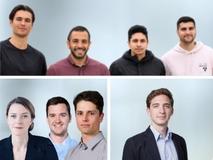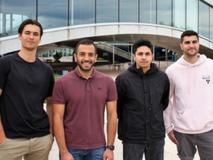CHF 40,000 for startups developing the next-generation of antibody engineering, enjoyable prosthetics, and antibodies for the treatment of Leukemia
15.09.2021
Adaptyv Biosystems, macu4, and Phire Therapeutics win Venture Kick's second stage of financial and entrepreneurial support. Their projects accelerate antibody discovery to develop better therapeutics, introduce a customization software that makes it possible to personalize a passive arm shaft in record time, and develop a novel immunologic approach to selectively eliminate the patient’s healthy and diseased hematopoietic cells.
 |
 Adaptyv Biosystems' founders: (from left to right) Julian Englert, Moustafa Houmani, Amir Shahein, and Daniel Nakhaee-Zadeh
|
 CEO Myriam Lingg, CTO Lukas Schiller, and Engineer Alec Chevrot
|
 Phire Therapeutics: CEO Dr. Jonathan Kiefer
|
Adaptyv Biosystems: enabling the next-generation of antibody engineering
Antibodies have become the fastest-growing class of therapeutics in recent years. They have great potential for the treatment of several high-impact diseases such as cancers, as well as autoimmune and metabolic diseases. However, antibody discovery is challenging. Current methods suffer from high screening costs, low throughput, and long discovery timelines. Moreover, companies are using an assortment of fragmented processes. Overall, this makes it difficult to generate large amounts of high-quality data about antibody discovery and to integrate this data to form the knowledge needed for better antibody design.
Antibodies have become the fastest-growing class of therapeutics in recent years. They have great potential for the treatment of several high-impact diseases such as cancers, as well as autoimmune and metabolic diseases. However, antibody discovery is challenging. Current methods suffer from high screening costs, low throughput, and long discovery timelines. Moreover, companies are using an assortment of fragmented processes. Overall, this makes it difficult to generate large amounts of high-quality data about antibody discovery and to integrate this data to form the knowledge needed for better antibody design.
Adaptyv Biosystems is developing a high-throughput antibody engineering platform using a combination of synthetic biology and nanofluidics. The team is composed of founders Julian Englert, Amir Shahein, Moustafa Houmani and Daniel Nakhaee-Zadeh Gutierrez. With their system, they can rapidly synthesize thousands of antibodies in parallel and analyze them for a multitude of important characteristics. This allows for the generation of high-quality data which is then being fed into a computational pipeline. Thus, by combining wet-lab experimentation with data analysis, each set of experiments provides real-world feedback that improves the design of the next set of antibodies. Using this iterative process, they can guide and accelerate antibody discovery to develop better therapeutics and create novel designs to tackle untreated diseases.
The Venture Kick funds will help them further develop and benchmark their platform while working in collaboration with their industry partners. adaptyvbio.com
macu4: design as a service for orthopedics devices
Customization of orthopedic devices is expensive, there is no Standard implemented ensuring the quality of 3D customized designs, and designs are often not sufficiently user-centric. Providers rarely focus on improving the design and lowering costs.
macu4's team, composed of CEO Myriam Lingg, CTO Lukas Schiller, Engineer Alec Chevrot, is creating new opportunities to provide validated and verified orthopedic designs. A software for professionals to customize at lower costs (part 1). And a 3D printable design to provide users with better access and satisfaction (part 2). The approach is suitable for different use cases – the 1st use case is a passive forearm prosthesis. In that area, up to 80% don’t use prosthetics and many of them because of costs. With the macu4 approach one shaft design is suitable for many arms, customized in minutes instead of hours and easy to use. The used design is 100% user-centric as it is an affordable system (up to 75% cheaper) being lightweight, breathable and fully modular. They employ synergetic business models for different stages of macu4 ranging from B2B for the customization software to B2B2C and B2C for the 3D printed medical devices. For the 1st use case, the market is estimated at 970k people with forearm deficiency (worldwide).
They plan to use the Venture Kick funds to finalize the technology in 2021 and get ready for the market launch in DACH in Q1-2022. macu4.com
Acute Myeloid Leukemia is a disease of an aging population. Since it originates from stem cells in the bone marrow, the only cure for AML patients is a radical elimination of their own hematopoietic system and the rescue with a hematopoietic stem cell transplantation (HSCT). To this day, this elimination is being performed with extensive chemotherapy. The majority of AML patients are elderly people who are unfit to receive these toxic therapies. Allogeneic hematopoietic stem cell transplantation (allo-HSCT) is a powerful intervention to cure life-threatening hemato- lymphatic diseases. Preparation (“conditioning”) for HSCT requires a combination of unspecific chemo-immuno-therapy and in some cases gamma-irradiation in order to remove healthy and malignant blood and immune cells. Many patients who might benefit from an HSCT are not eligible for it as conditioning is associated with severe off-target side-effects.
The team behind Phire Therapeutics found itself during a 4-year long collaborative effort between ETH Zürich and University Hospital Zürich. Prof. Markus Manz is the chair of the Department of Medical Oncology and Hematology at USZ. Prof. Dario Neri is Full Professor and Chair of Biomacromolecules at ETH Zürich. Both will be Scientific Advisors to Phire Therapeutics. Dr. Jonathan Kiefer was Pioneer Fellow at ETH Zürich and is now Project Leader of the Wyss Zurich Project Phire. At Phire Therapeutics, they are developing a novel immunologic approach to selectively eliminate the patient’s healthy and diseased hematopoietic cells and therefore enable HSCT and potential cure. With this, they aim to be the catalyst that enables three times more HSCTs and thus the regeneration of a healthy blood system. The market for hematopoietic stem cell transplants is growing at a compound annual growth rate (CAGR) of 6%. Every year more and more patients can be treated by an HSCT, so the number of performed transplants rises every year. The projected value of the total market in 2021 is estimated to be $15.9 billion.
The funds from Venture Kick will be used for Business Development and IP-related experiments.


